
Activity Reports
Kitchen Assistant Directors (ADs)
October 5, 2011
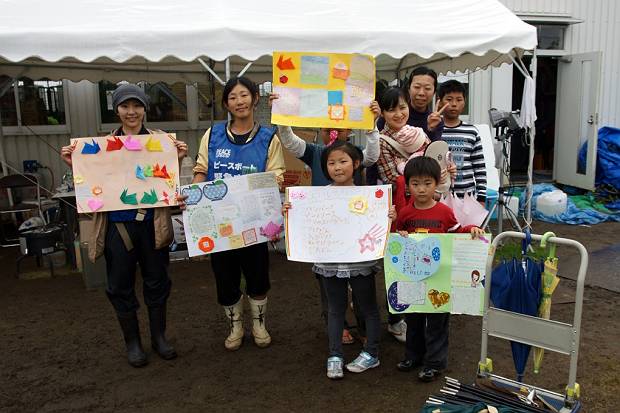
Yoko (far left) and Kazumi (second from left) with letters of thanks from local residents (May 29, Ishinomaki Senshu University)
Since Peace Boat launched its relief activities in Ishinomaki, the food provision team has prepared a total of more than 100,000 meals. This report follows the Assistant Directors (ADs) who have long been working with this team, Morinaga Yoko (in charge of the kitchen) and Kitamura Kazumi (in charge of support towards self-sufficiency).
Assistant Directors are responsible for coordinating volunteers, in groups of around five persons each. Peace Boat appoints ADs for each kind of work, according to their experiences and skills. These staff work in the field long-term, and through being familiar with the changes in required relief activities play a vital role in ensuring that the work undertaken is safe, smooth and efficient.
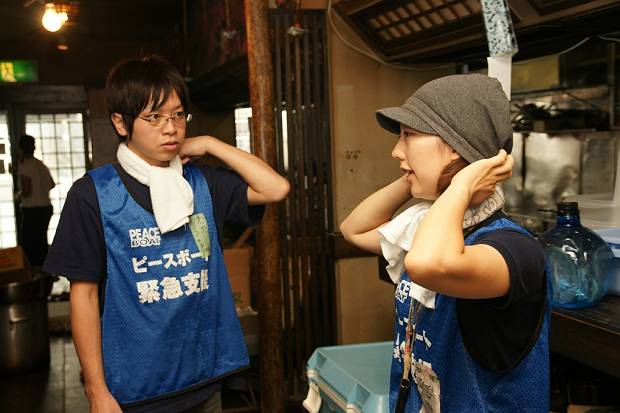
Upon arrival at Kozan, where the Central Kitchen is located, at 8 am, Yoko is already hard at work preparing the kitchen and surrounds. Her fast and sure movements demonstrate her long experience as a qualified nutritionist.
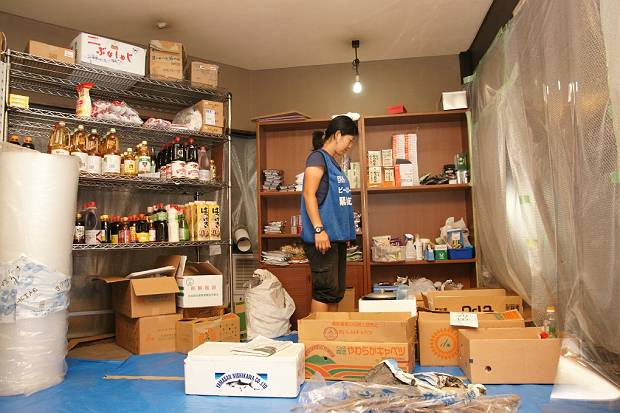
This is Kitchen and Delivery AD, Kazumi. She is considering the distribution of food and condiments to be carried on this day. As a licensed chef, her experience has been a strong support for the kitchen. The food preparation and delivery teams have been active for a long time, and now through working together with local residents to undertake these activities the formation of a new and warm community has meant a lot to Kazumi and the team.
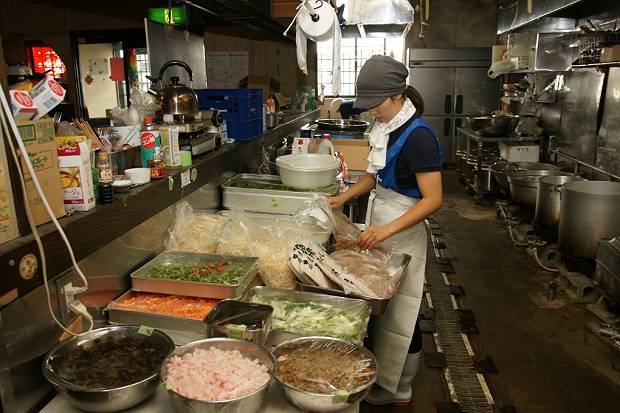
Yoko begins the day’s food preparations. Today’s menu is fried rice with Chinese style soup.
In order to prepare such a large amount of food in a short time, Yoko is responsible for considering preparations from the day before, ensuring that things go smoothly.
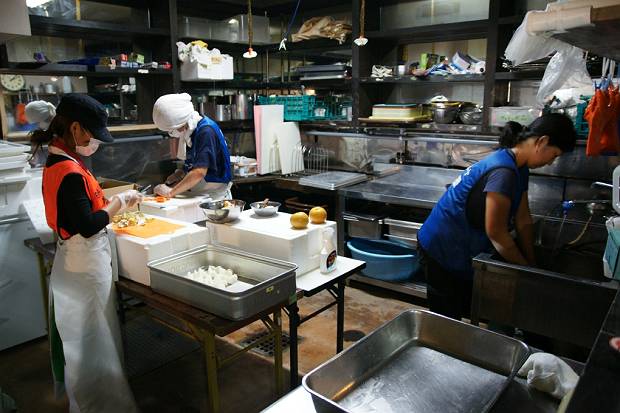
Kazumi (right) working together with other members in the kitchen.
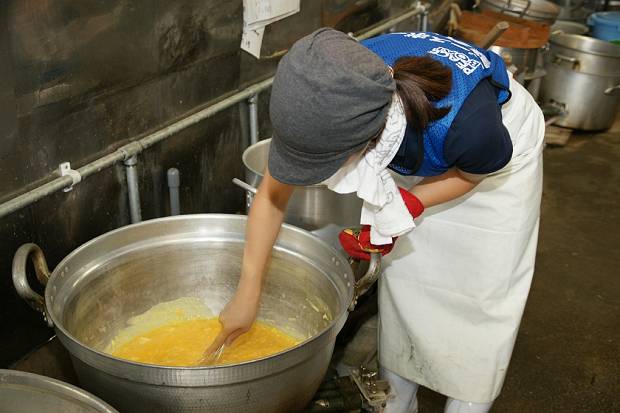
Scrambling eggs to be used for fried rice for 330 people!
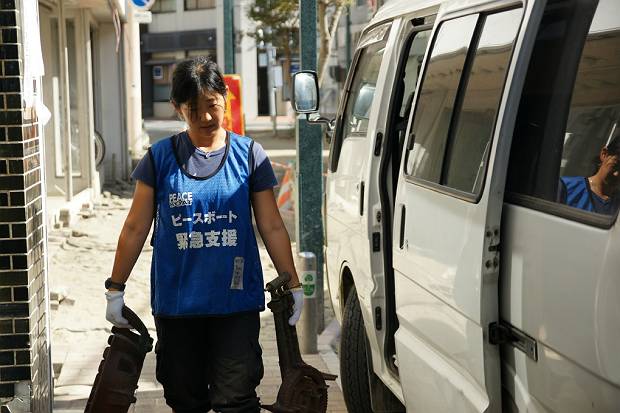
Maintaining and preparing cooking equipment to be used in the field is an important part of the job.
The meals today will be delivered in the Koganehama district and Onagawa town. Furthermore, as projects to support self-sufficiency in residents, barbecues and traditional potato soup events will be held at lunch and dinner times in the Sengarita and Shintate districts. This is a particularly busy day for Kazumi as she heads out.
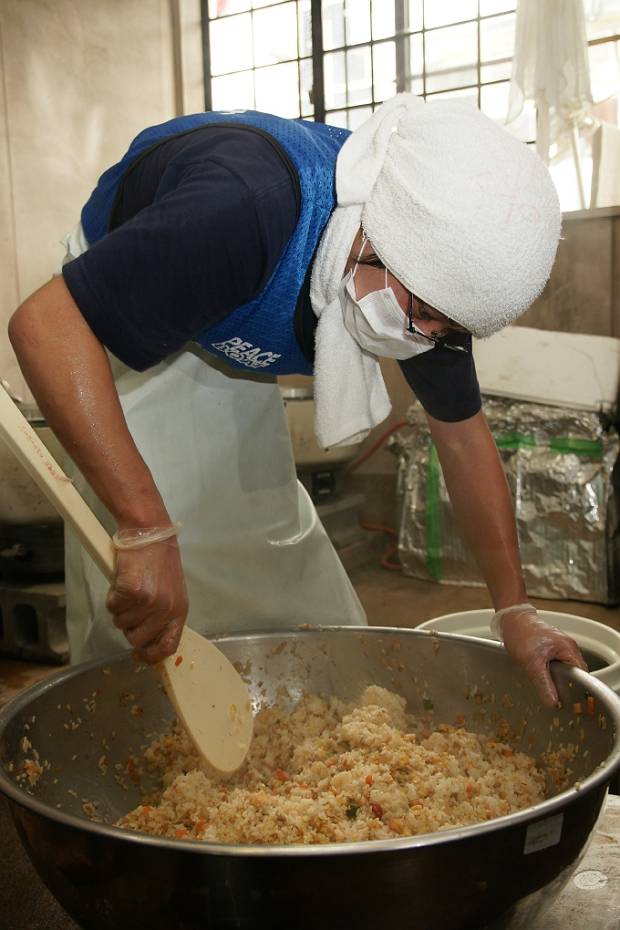
Kitchen staff Watanabe-kun mixing the fried rice.
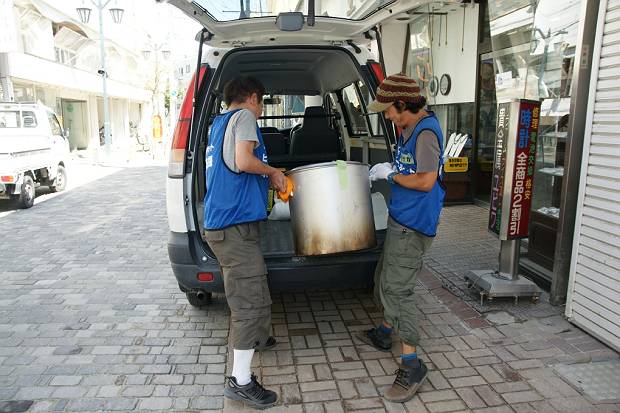
The delivery team loads the prepared meals onto the van.
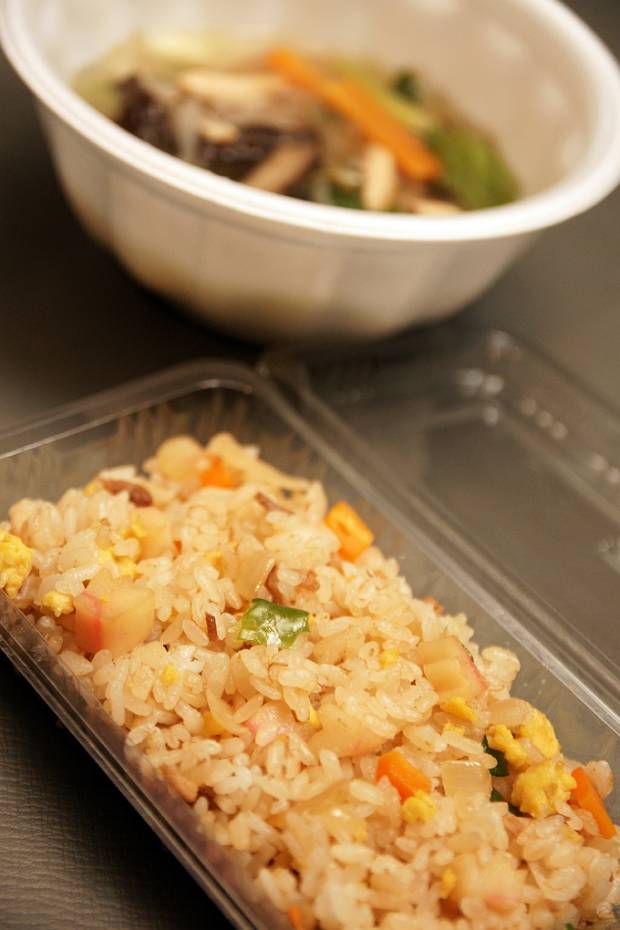
To ensure that the meals neither run out nor are leftover, samples of the amount for each portion are also prepared before departure.
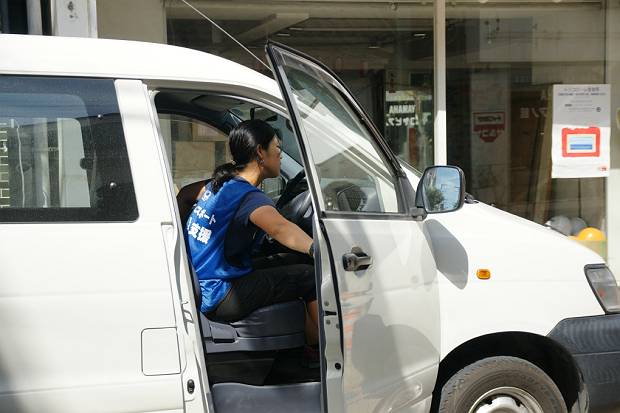
Loaded up, Kazumi heads towards the traditional potato soup and barbecue locations.
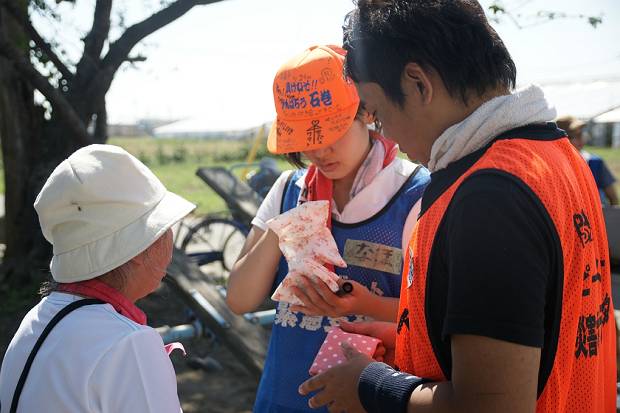
On some occasions, local residents present warm gifts to the staff - this day, they were lucky enough to be given handmade handkerchief and tissue holders.
Although some districts are only visited once or twice weekly, a strong connection and trust between the staff, volunteers and local community has been built through regular visits. An elderly woman who participated for the first time shared that “it’s not good to just stay at home depressed alone. I’m really glad that I came today – and I’ll be back!”
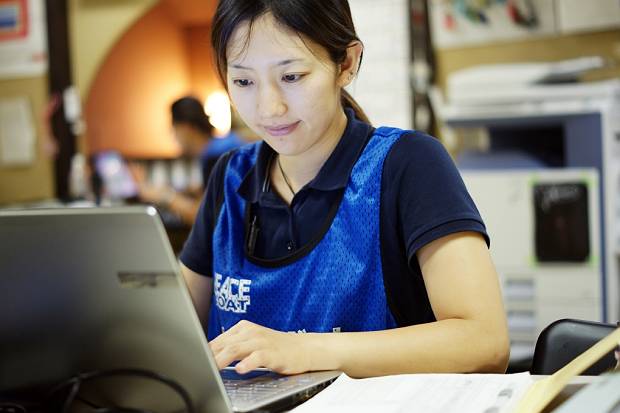
After the meal preparations are complete, Yoko turns to the computer.
After the day’s cooking and cleaning up has finished in the kitchen, Yoko heads to the second floor to confirm stock and order new supplies. There are many items necessary for nutritional balance other than those food items which are donated. Yoko creates the menu several days in advance, and managing food supplies and stock is an important part of her role as AD.
——————
An interview with ADs Yoko and Kazumi.
Q: Could you let us know where you are from, what you were doing before coming to Ishinomaki, and something about yourselves?
Yoko: I am from Kamakura in Kanagawa Prefecture, and I am a professional nutritionist. I used to teach at universities and so on. I love music, and often go to see live performances. Actually today one of my favourite bands is playing in Yokohama, so in a way my heart is on its way there, hehe.
Kazumi: I’m also from Kanagawa Prefecture, and I was living in New Zealand for seven years working as a chef.
Q: How did you learn about Peace Boat’s disaster relief activities, and when did you first participate?
Yoko: After the disaster I was searching through lots of different places, and came across Peace Boat’s activities through the home page and twitter. I had often seen Peace Boat’s posters around and knew about its global voyages, and was quite surprised to hear of its disaster relief activities. I came to Ishinomaki as part of the second group of volunteers, so arrived on April 2.
Kazumi: I was in New Zealand at the time and learnt about it from the homepage. I didn’t know anything about Peace Boat before participating. There was a lot of information about Peace Boat on the internet, and so I decided to come and see for myself. After returning to Japan from NZ, I came to Ishinomaki in the sixth group of volunteers, from Golden Week.
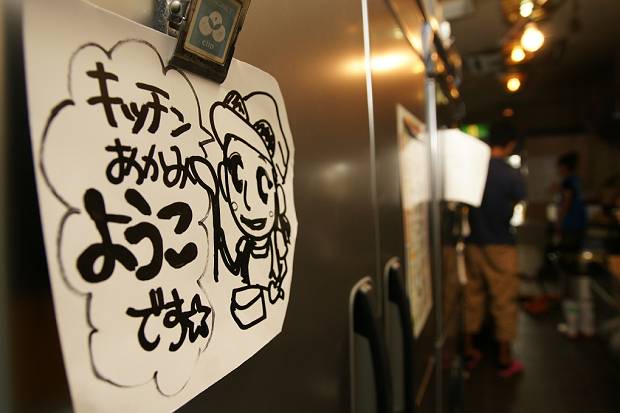
A cartoon of Yoko on the kitchen refrigerator - showing her soft, friendly personality!
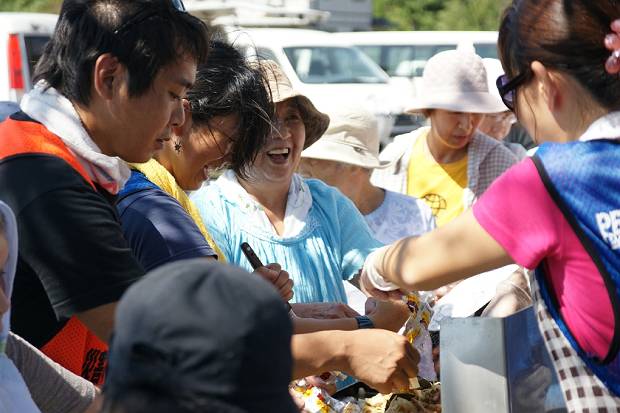
Kazumi cheerfully preparing food at the barbecue - her energetic, bright personality always creates a great atmosphere.
Q: What was your impression when you first arrived at Ishinomaki?
Yoko: To be honest, I was thinking “is this really Japan?” It seemed like a dim movie set without any people, and I remember being asked by one of the local survivors, “why have you come to such a place?”
Kazumi: I was much more shocked seeing the situation here in person than I had been after seeing it on television. When I looked at the scene from Hiyoriyama Park overlooking the city, I was brought to tears.
Q: Were you originally hoping to join the kitchen activities?
Yoko: I was planning to do anything at all at first, but also hoping to join the meals provision activities. At first I joined the cleaning team, and then also worked to distribute radios outside a small store and so on.
Kazumi: I was always hoping to work in the kitchen. I planned to stay for a long time, and since I had some health issues in the past such as a hernia operation I thought that I would only last a week if I was working on cleaning activities.
Q: Please share with us some times when you have felt the work was most worthwhile, and some things that have been difficult.
Yoko: The amount of meals we were preparing was huge (at its peak, 7000-8000 meals in one hour!) and so I was not able to leave the kitchen, always cooking at a huge space. I was really happy to hear reports at meetings from delivery team members who had been outside. Since then we have had more members and things have settled down somewhat, so now I am able to leave the kitchen and meet and communicate with local residents – which gives of course a huge new motivation. I am so glad to be able to build these connections and trust, and speak with local people.
Kazumi: At first I had also hoped to support care activities in the evacuation centres, but I wasn’t able to get out of the kitchen. At the moment, through the 自活支援 programmes it is great to be able to cook and eat together with local residents, and I believe this environment is really fulfilling. I was so glad recently when I visited the evacuation centre at the 好文館高校 and was told, “It is great that Peace Boat came here. If you hadn’t, we wouldn’t have the will to be able to be here together cooking and eating. We found the seeds of hope ourselves, but it was Peace Boat that watered and nurtured those seeds for us. It was you, Kazumi. Thank you.”
As for things that were difficult… nothing in particular!
Q: Looking back on the activities until now, what kind of involvement are you hoping for in the future?
Yoko: Through being involved for quite an extended time, the best part is being able to see the city shift towards the recovery stage, seeing how hard other members are working, and being able to share joys and progress together. The people in evacuation centres have such strength, and they are actually always supporting us. Ishinomaki is now my second home, and I am sure I will be coming here often next year, three years from now, five years from now, and in the future.
Kazumi: The meal provision we are continuing now started from visiting each nearby house one by one. Of course one day this provision will come to an end, but I hope it won’t just be “okay, that’s it, finished.” I hope we can continue to create together places where residents can gather together, and use cooking and food as a tool to bring happiness.
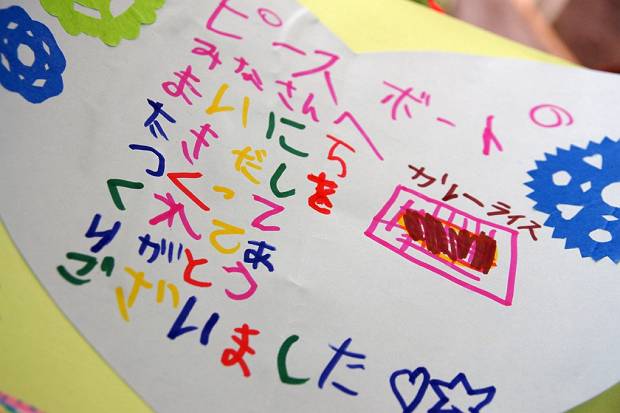
A letter of thanks from local children, given just before the kitchen team moved from the outdoor tent at the Ishinomaki Senshu University campus to Kozan (now the Central Kitchen.)
The fact that the meals prepared by the kitchen volunteers and brought around the region by the delivery volunteers has changed from “food in order to survive” to “food in order to build connections between people” is certainly a result not just of the half a year that has passed, but of the support and dedication of many people such as Yoko and Kazumi.
All photos by Nakamura Mitsutoshi
TAGS: delivery • Disaster Relief • Earthquake • food provision • Ishinomaki • Japan • Kanto-Tohoku Earthquake and Tsunami • kitchen • Onagawa • Peace Boat • peaceboat • Relief • takidashi • Volunteer • volunteering • Volunteers


